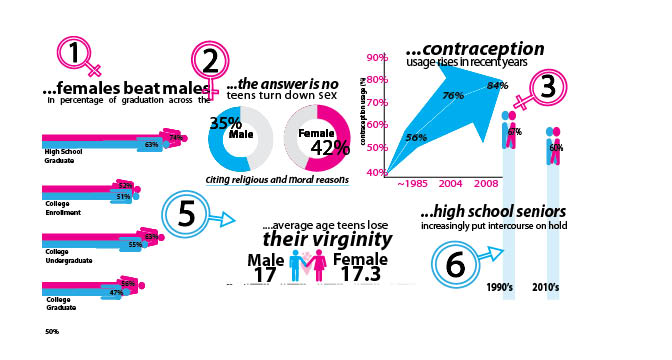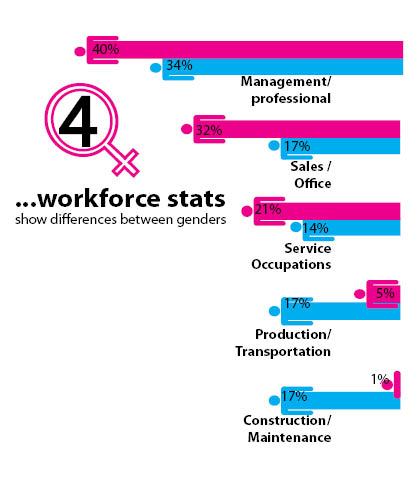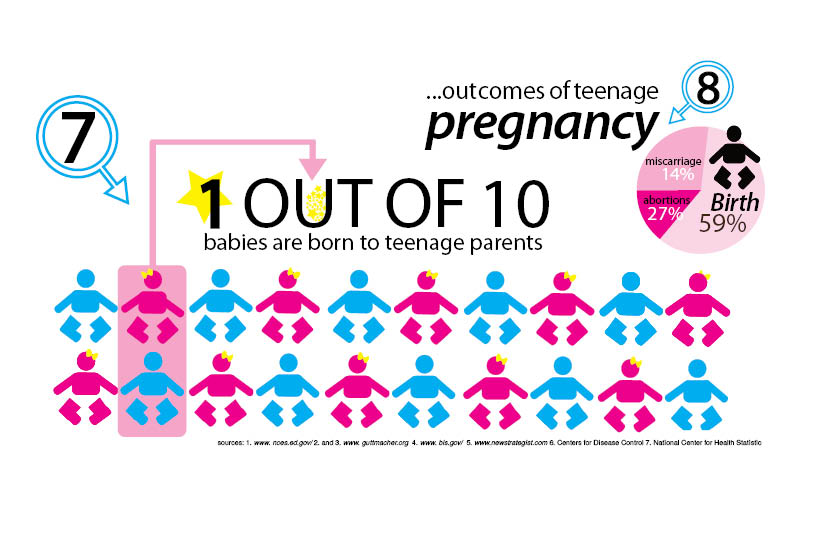Battle of the Sexes
|
|
Stereotypes define the ways many students interact, especially gender stereotypes as you will see in this special report. Gender stereotypes affect everything from how both genders view the other to how individuals view themselves.
|
Stu dents dissect stereotypes
dents dissect stereotypes
Senior Jessica Jost felt the words slap her in the face as others made fun of her for getting a job at Subway. ‘Make me a sandwich.’
She knew it wasn’t because she worked at a fast food joint; she was proud for getting a job. What angered her was her male friends making fun of her for being a woman in the stereotypical role of sandwich-maker.
Social norms stem from birth, starting with mimicking adults’ actions, according to the Child and Adolescent Services Research Center. From birth through age eight, parents influence the motor and social behaviors of children.
Sociology and psychology teacher Bruce Wilson said children learn from observations in early childhood. During this time, a person’s societal norms develop to form stereotypical roles like the working father or stay-at-home mother. From confidence in one’s actions to washing hands after using the restroom, parents set the behavior and values their children manifest.
“Your parents teach you and tell you things, but the most important thing that they do is show you how to act,” Wilson said.
Since she was born, Jost’s parents have supported her in every area of life. They encouraged her to aspire toward college, get a job and try out for sports. Instead of following through with these goals, the lasting opinions of another individual stopped Jost from pursuing areas she considered fun.
“When I was in third grade, I joined a youth basketball team,” Jost said. “I wasn’t particularly good, but I had fun anyways. One day a boy came up to me and said that white girls shouldn’t be allowed to play basketball. I quit pretty quickly after that. Every time I think of basketball I associate a negative connotation with it.”
The boy who hindered Jost thought girls had certain activities they were entitled to, but a sport was not one of them. These same ideas can also be seen on a larger scale with high school sports participation. According to the National Federation of State High School Associations, 55.2 percent of students enrolled in high schools participated in athletics in 2008-2009. Of those participants, 3.1 million girls participated, compared to 4.4 million male high school athletes.
Disparities between the genders prevail even in the workplace, especially in large businesses. Statistics from May 23, 2011 collected by www.money.cnn.com show only 12 women in Fortune 500 companies to be CEOs. With all jobs in consideration, Fortune 500 companies included, women comprise 49.8 percent of payroll employment, according to www.jec.senate.gov. Jost believes the elite job market is open to anyone, despite the incident concerning basketball.
“From what I’ve seen, the girls of this generation have never been told they couldn’t be president, CEOs or whatever they want out of life,” Jost said, “and that attitude will continue to shape their desires as they become adults.”
The average male works 2.7 hours a week more than the average woman, according to the U.S. Department of Labor. Men work a total of 43.5 hours and women work 40.8 hours a week. Senior Nate Egharevba said the reason for the difference in working hours is the traditional role set before women. He believes people need to question these roles in order to form a better society and an even better place at home.
“I don’t think a man should be able to go out and do whatever he wants, while the woman has to stay home and takes care of the house and stuff. I feel like a woman has a lot to offer,” Egharevba said. “There should definitely be a balance. You have to be able to do everything in a household in order to make it work.”
Wilson said women and men who break the societal norms in the workplace face judgment of differing degrees based on how progressive the city is. In the modern city, breaking a norm is more in style and therefore more widely accepted, while in a small-town environment, the reciprocal is true. Individuals with more traditional outlooks face disapproval in towns, since many townspeople respect adherence to tradition.
“It takes a person that can really handle it to break those norms as with female truck drivers or male nurse[s],” Wilson said, “because not only are you doing your job, but you are being compared to other people that are a different gender than you.”
Wilson is hopeful for the future advancement of the roles that both men and women will take outside of the societal norms. Even with constant disagreement from other people, he agrees that with time, norms are bound to change.
“I think we are definitely in a transition that I think I could see in 20 years that those social norms about the family could be diminished,” Wilson said. “Not gone, but could certainly be diminished.”
By Parker Sutherland
Sex standard degrades females, praises males

 The stereotype goes that boys become sex hounds after puberty and think of sex multiple times every minute, while girls are expected to remain chaste.
The stereotype goes that boys become sex hounds after puberty and think of sex multiple times every minute, while girls are expected to remain chaste.
But, like so many stereotypes this one is probably faulty.
According to www.thenationalcampaign.org, 78 percent of teenage males say there is too much pressure from society to have sex, causing 60 percent of those males to have lied about their sexual experiences.
Junior Sasha Martin cringes at the thought of the double standard between guys and girls and its repercussions when it comes to teenage sexual activity.
“Guys are praised if they have sex with girls that are or aren’t their girlfriend, but if a girl has sex with a whole bunch of guys, she is called a hoe,” Martin said. “In reality they are both doing the same [thing] and should both be called whores.”
Martin said she has friends who have fallen into this trap, which in some cases has ruined their reputations. However, she also has a fair share of acquaintances who try to make a difference in spite of society’s stereotypes.
Hickman High School junior Marissa Jackman, one of Martin’s close friends, is attempting to change teenagers’ reactions to sexual activity. Though she chooses not to engage in this herself, Jackman said girls should just live how they believe and not care what anyone else says.
“If you are comfortable with yourself enough to maturely make that kind of decision and to verbally support yourself, what people say to you shouldn’t affect you,” Jackman said. “Therefore, if you are making the right decision for you, the standard shouldn’t apply.”
Although Jackman said teenagers shouldn’t judge, she realizes this is unrealistic and continues fighting against the stereotype.
Once, while Jackman ate lunch with a group of teenage boys and girls, a pregnant student walked by. She said the boys began making snide remarks. The boys persistently degraded the female when Jackman decided to step in.
“They started making derogatory comments about how she was a slut for getting pregnant. So I just brought up where they thought the boy in her life was. They said it didn’t matter if he was involved because she was still a whore. But I then told them that they both chose to have sex, meaning, it wasn’t just her decision,” Jackman said. “The boy had just as much responsibility as she did, even though she was free to make her own choices. Sex is a choice. She was being judged for choosing to have it; it’s her decision and her life.”
Situations like those cause Jackman to loathe the standard even more. Jackman said some men will have a false bias toward women, which she said is unjust.
However, Martin and Jackman aren’t the only ones who see the statistics play out in the lives of their peers.
According to www.troubledteens.com, 25 percent of sexually active teens are depressed, causing 14.3 percent of those females to attempt suicide. Statistics confirm negative consequences for female sexual activity.
Jennifer Beggs-Weber, a Ph.D. candidate/instructor at the University of Missouri- Columbia, studies the double standard among genders, developing her own personal opinions on the issue.
“While studies suggest that women are gaining more control over the conditions of sexual intercourse and that female pleasure is becoming less taboo and viewed as a positive expression of personhood for women, there is still a double standard that exists that privileges men’s sexuality and sexual activity over women’s,” Weber said. “Men are considered to be naturally sexual and sexually obsessed, while women are considered to be naturally chaste, virginal.”
Weber said the double standard has changed slightly through time as women are becoming more sexually active and independent; however, the context within which they can have sex is still constraining.
“Girls today may be able to have sex without being stigmatized, but only when in a serious relationship. Girls who have sex outside of a serious relationship or girls who change boyfriends too much or too soon risk being labeled a slut,” Weber said. “Boys, on the other hand don’t face this risk; they don’t have to worry about changing girlfriends or moving on too quickly.”
Consequently, girls have less power in the relationship, as fear of being defamed is a powerful reason to stay in a relationship, Weber said. Boys, on the other hand, don’t face this judgment. Instead, boys mainly receive praise from their peers.
However, females aren’t the only ones who observe the double standard’s impact, junior Andrew Silvey witnesses the effects of this standard often because of praise frequently given to guys once they have had sex.
“When guys hook up with chicks, they get congratulated,” Silvey said. “But when girls get with guys they can be viewed as slutty or gross.”
Silvey said while this standard doesn’t impact his personal life, he sees his peers use it to their advantage, leaving huge repercussions for the girls drawn into it.
“We watch the girls just get cheated. They get chastised for something men can do,” Silvey said.
Weber feels society must challenge the judgmental assumptions. This can happen if people act true to their words.
“Many times people will say they are against the double standard,” Weber said, “but then reinforce it with their comments and treatment of other people, saying, ‘I heard she had sex with him at that party.’”
Although the standard is used around junior Daniel Lee, he chooses to practice other methods, not following the standard and doing what he believes.
“I do what I do because I want to,” Lee said. “So I think it’s fine to let the chicks do whatever they want to do, as well.”
While Lee watches some of his closest friends of the opposite sex sleep with various people often, their actions don’t change his view of the individuals.
“In my mind it doesn’t make her a hoe; she’s a homie,” Lee said.
However, no matter the sexual actions of a female, or the derogatory term associated with them, the pressure teenage males feel to engage in sexual activity allows them to act freely with fewer repercussions.
While the main issue continues to concern the double standard and its negative effects, Jackman believes people should ultimately be able to act independently without judgment, regardless of gender.
“If you choose abstinence, so be it,” Jackman said. “Therefore, if you choose to be sexually active, that is not only your personal decision but your personal business.”
By Mahogany Thomas
Motivation drives female students ahead
Imagine a cliché romantic comedy of a girl’s search for her one true love. But then, she accidentally bumps into a stranger on the street and makes an instant love connection as they lean over to pick up her dropped groceries.
But the story’s happily ever after is interrupted when she finds out he is still living at home with his mother.
According to the U.S. Bureau of the Census, 14 percent of males between the ages 25 and 34 live at home, compared to only eight percent for their female counterparts. Young men today lack the motivation to achieve their goals and are twice as likely to live at home with their parents as women are. They’re also less likely to finish college or to have a job.
Psychology teacher Tim Drennan believes this may be because society has changed and women are at times more driven than men.
“Men figure that women would stay home, and women don’t stay home anymore. I think social scripts have something to do with it, but I think society has changed also,” Drennan said. “Women have realized that in order to get ahead in life they have to work harder, and I think they do. Now that the competition is head on, that jobs are open to men and women, [the] men are losing out.”
Failure to launch in men can come in forms other than inadequacy in the workplace. Their lack of motivation shows their educational efforts. Just more than a century ago, 100 percent of Ph.D. graduates were men. In fact, men were the primary receivers of bachelor’s degrees.
But three years ago, women surpassed men in receiving doctorate degrees, a shift that continues to the present day. According to the U.S. Department of Education, in just the past 10 years, women have increased their share of doctoral degrees by more than six percent. They also earn about 60 percent of all bachelor’s and master’s degrees.
The drive for college excellence can start earlier and begin in a person’s high school career. Sophomore Alexa Shelton believes girls are often more motivated than boys in high school and consequently may work harder.
“One time I was in a group with this guy, and he basically just made me do all the work,” Shelton said. “So I took the stuff home and did the assignment. And when we got to school, we had to present in front of the class, and he took all credit during the presentation.”
Shelton’s situation is common outside of high school. Linda Babcock, a professor at Carnegie Mellon University, co-authored “Women Don’t Ask: Negotiation and the Gender Divide.”
In the workplace women may be doing more work than men but may not receive credit for it. In 2009, female workers earned 23 percent less than males in the same positions. Babcock said assertiveness in the workplace relates to the reason women do more work but receive less credit.
“Women often expect that hard work and high quality work will be recognized and rewarded without their asking. And this is frequently not true,” Babcock said. “Because they don’t ask to be considered for the opportunities and advantages for which men ask, they often aren’t recognized for the good work they do and don’t progress as fast or as far in their careers as their talents should take them.”
In the workplace and in school, gender differences are growing and motivation is decreasing. Drennan notices these shifts in his classes.
“Of my classes — which is not a perfect sampling — generally women are at the top. A few men, but generally the women’s average is higher than the men’s,” Drennan said. “But then at the same time, I have more women than men in this class.”
School courses offered are another outlet for gender differences to arise. Like Drennan, teachers observe differences between the genders in work ethic and effort. But these differences are not always enough to convince teachers that girls are more driven than boys in school. Personal finance teacher Susan Lidholm believes that boys and girls are more prominently.
“I can’t predominantly say if it’s a male-female difference, but something that depends on the individual,” Lidholm said. “I think the amount of effort someone exerts depends on their interest in the course their taking.”
Psychologist Roy F. Baumeister, a former professor at Princeton University and current professor at Florida State University, said the average intelligence test scores show little variation between the IQ of men and women, with few exceptions in mathematics and verbal measures.
Further studies by Cambridge and Oxford Universities prove the same, supporting Lidholm’s assertion that gender is not the best predictor of abilities and interests.But this does not mean motivation is the same in men and women. Society’s expectations and social scripts can guide the actions of individuals.
“From video games, to action packed dramas on TV, I think we still say those are the kind of people that men should be. And I’m not sure that’s all that realistic that everybody can be what those people are on TV,” Drennan said. “I think that men are going to have to do the same thing that women had to do — realize that it’s going to take a little more for them to catch up.”
By Jude El-Buri






















































































